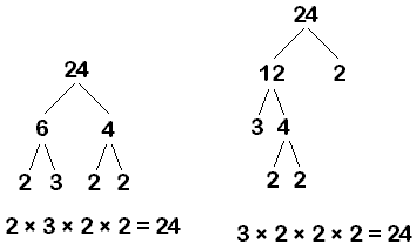Prime and Composite Numbers
A prime number has exactly two factors, the number 1 and itself. It is not evenly
divisible by any other whole number.
Example:
What are the factors of the number 5?
1 × 5 = 5 The numbers 1 and 5 are the only factors of 5.
Therefore 5 is a prime number.
Any number greater than 1 that is not a prime number is called a composite number. The
number 18 is a composite number because it has three factors: 2, 3, 3.
Any whole number greater than 1 can be written as the product of prime number factors.
This is called prime factoring. One method of finding the prime factors of a whole
number is to make a factor tree. The branches end in prime numbers.
Example:

The number 1 is not a prime number. The smallest prime number is 2.
|